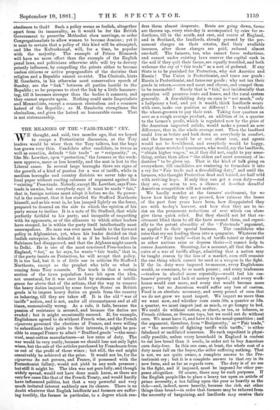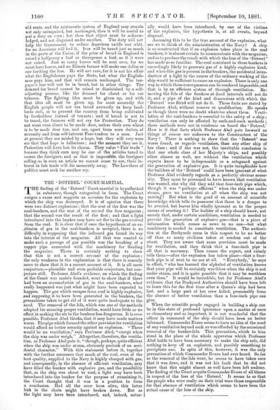THE MEANING OF THE " FAIR-TRADE " CRY.
T,UrE thought, and said, two months ago, that we hoped
• V to escape a Protectionist discussion, as the Tory leaders would be wiser than the Tory talkers, but the hope has grown very thin. Candidate after candidate, in towns as well as counties, defends " fair trade or " reciprocity," or, like Mr. Lowther, open "protection," the farmers or the work- men approve, more or less heartily, and the seat is lost to the Liberal cause. In several large boroughs there are signs of the growth of a kind of passion for a war of tariffs, while in medium boroughs and country districts we never take up a local paper without reading columns of argument against the " existing " Free-trade. Nobody, except Mr. Lowther, says Free- trade is unwise, but everybody says it must be made " fair," that is, foreign nations must adopt it before we do. So power- ful is the current, that it has startled Sir Stafford Northcote himself, and as his wont is, he has jumped lightly on the fence, prepared to descend on the side to which the opinion of his party seems to incline. It is a note of Sir Stafford, that while perfectly faithful to his party, and incapable of coquetting with its opponents, or of the alliances to which other leaders have stooped, he is within the party itself intellectually most unscrupulous. No man was ever more hostile to the forward policy in Afghanistan, yet, when his leader decided on that foolish enterprise, he defended it as if he believed that the Suleiman had disappeared, and that the Afghans might march to Delhi. He is one of the most convinced Free-traders in England, " but," as he says, he wants " fair trade," that is, if the party insists on Protection, he will accept that policy. It is too bad, but it is of little use to criticise Sir Stafford Northcote, except as the prophet who tells us what is coming from Tory counsels. The truth is that a certain section of the town population have hit upon the idea, not unnatural, for it was once held by statesmen of intelli- gence far above that of the artizan, that the way to remove the heavy duties imposed by some foreign States on British goods is to impose heavy duties on goods from the country so behaving, till they are taken off. It is the old " war of tariffs" notion, and is not, under all circumstances and at all times, economically wrong. As a rule, it fails, because the passion of resistance is aroused, and because the duties are evaded ; but it might occasionally succeed. If, for example, Englishmen agreed to do without French, wine, and the French vignerons governed the elections of France, and were willing to subordinate their pride to their interests, it might be pos- sible to compel France to admit " Bradford goods "—the semi- wool, semi-cotton manufactures—at low rates of duty. The war would be very costly, because we should lose not only light wines, but the sale of the articles purchased by Frenchmen from us out of the profit of those wines ; but still, the end might conceivably be achieved at the price. It would not be, for the vignerons do not govern, and France, if possessed with the Protectionist fallacy, would not yield to any such pressure ; but still it might be. The idea was not pure folly, and though widely spread, would not have done much harm, as there are very few cases like that of the French Treaty, and would hardly have influenced politics, but that a very powerful and very much irritated interest suddenly saw its chance. There is no doubt whatever that English landlord( and farmers are suffer- ing terribly, the former in particular, to a degree which ren-
ders them almost desperate. Rents are going down, farms are thrown up, every rent-day is accompanied by cries for re- ductions, till in the south, and east, and centre of England, and in Scotland, the landlords, already pressed by the per- manent charges on their estates, find their available incomes, after those charges are paid, reduced almost one-half. The farmers, too, who cannot force reductions, and cannot under existing laws recover the capital sunk in the soil if they quit their farms, are equally troubled, and both welcome the cry of "fair trade" as a sort of godsend. If any State is to be punished for Protection, why not America and Russia ? The Union is Protectionist, and taxes our goods : Russia is Protectionist, and taxes our goods ; why not tax their goods in return,—corn and meat and cheese, and compel them to be reasonable ? Surely that is " fair," and incidentally that operation will preserve rents and leases, and the rural system generally. A five-shilling duty on corn is "not much," only a halfpenny a loaf, and yet it would, think landlords weary with care, make our position so different ! It would enable- the wheat-growers to pay their rent. Taking four quarters an acre as a rough average product, an addition of 5s. a quarter to the farmer's profit, which is regulated now by the price of the American imported article, would make a pound an acre difference, that is, the whole average rent. Then the landlord could live as before and look down on everybody in comfort, and the farmer would be at rest about rent, and agents would not be bewildered, and everybody would be happy, except those wretched consumers, who would, say the landlords, " obtain higher wages," or, if they did not, ought to pay some- thing, rather than allow "the oldest and most necessary of in- dustries " to be given up. That is the kind of talk going on everywhere, till candidates are venturing to formulate it into a cry for "Fair trade and a five-shilling duty," and until the farmers, who thought Protection dead and buried, are half wild with reviving hope. If only they can get a corn duty—and they see, or seem to see, a chance of it—that dreadful American competition will not matter.
We hardly wonder at the farmers' excitement, for we know how hardly they are pressed, how ruinous the losses of the past four years have been, how disappointed they are with to-day's harvest, and how slow they are to in- sist on the permanent reductions of rent which can alone give them quick relief. But they should not let that ex- citement blind them to all the facts around them, and especi- ally to the patent absurdity of the " Fair-trade " argument, as applied to their special business. The candidates who raise that cry are leading them into a quagmire. Whatever the merits of " Fair trade"—that is, of tariffs raised or depressed as other nations raise or depress theirs—it cannot help to coerce Americans. Granting, for a moment, all that the advo- cates of a war of tariffs allege, admitting that a nation may
be taught reason by the loss of a market, corn still remains the one thing which cannot be used as a weapon in the fight. If the 5s. duty were imposed to-morrow, every Englishman would, as consumer, be so much poorer ; and every tradesman
—traders in alcohol more especially—would feel his cus- tomers' poverty and lack of money to spend ; and every work- house would cost more, and every riot would become more grave ; but no American would suffer any loss of custom. Food is an absolute necessary, and every pound of corn that we do not grow we must import. We import no more than we want now, and whether corn costs 50s. a quarter or 55s. a quarter, we must import just as much, or go hungry to bed. We could do without cotton, or claret, or tea, or tobacco, or French ribbons, or German toys, but we could not do without corn. We must have it, and have it in the usual quantities ; and the argument, therefore, from "Reciprocity," or "Fair trade," or " the necessity of fighting tariffs with tariffs," is either falsehood or undiluted nonsense. No such expedient is physi-
cally possible, unless every household in England is content to eat less bread than it needs, in order not to buy American corn duty-free. In this one case, at least, the whole cost of a duty must fall on the buyer, the seller suffering nothing. That is not, we are quite aware, a complete answer to the Pro- tectionist cry ; but it is a complete answer to that cry in its new form, and as far as regards corn. The duty is of no use in the fight, and if imposed, must be imposed for other pur- poses altogether. Of course, there may be such purposes. If the English people like to place a heavy tax upon an article of prime necessity, a tax falling upon the poor as heavily as the
rich—and, indeed, more heavily, because the rich eat other things than bread—in order that farmers may be relieved from the necessity of bargaining, and landlords may receive their old rents, and the aristocratic system of England may remain not only unimpaired, but unchanged, then it will be useful to put a duty on corn ; but then that object must be acknow- ledged, and not disguised under another. The duty will not help the Government to reduce American tariffs one whit, for no American will feel it. Iron will be taxed just as much in the ports of the Union, if the price of bread in England is raised a halfpenny a loaf or threepence a loaf, as if it were not raised. Just as many loaves will be sent over, for we must have loaves, and no Illinois farmer will make one dollar or one farthing the less. He will not care, for it is not his affair what the Englishman pays the State, but what the English- man pays him, and that will remain unchanged. The tax- payer's loss will not be in bread, but in other things. The demand for bread cannot be raised or diminished by a self- adjusting process, like the demand for claret or for cut tobacco. The fighting idea must be given up, and with that idea all must be given up, for most assuredly the English people will not tax bread avowedly to keep land- lords rich, or to prevent the country from being cultivated by freeholders instead of tenants ; and if bread is not to be taxed, the farmers will not cry for Protection. They do not want even claret to be made dear, unless their own wheat is to be made dear too, and are, apart from corn duties, of necessity and from self-interest Free-traders to a man. Just at present they are misled by a hope, but they will very soon see that that hope is fallacious ; and the moment they see it, Protection will have lost its charm. They value " Fair trade " because they think corn may be one of the articles taxed to coerce the foreigner, and as that is impossible, the foreigner selling us in corn an article we cannot cease to use, their in- terest in fair trade will die momently away. The Lowthers of politics must seek for another cry.































 Previous page
Previous page